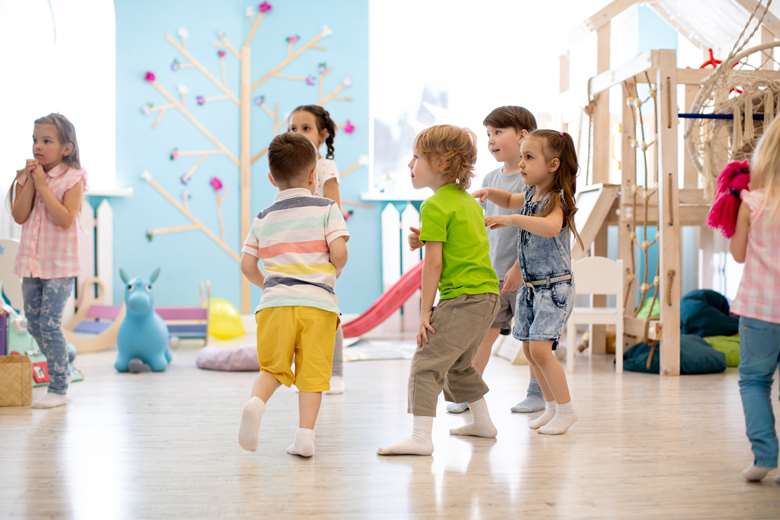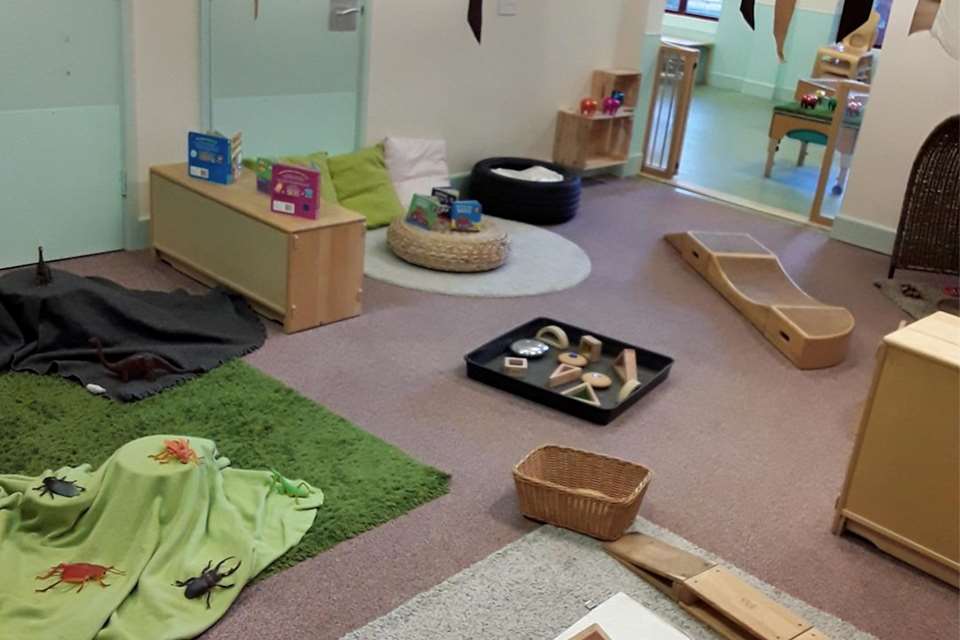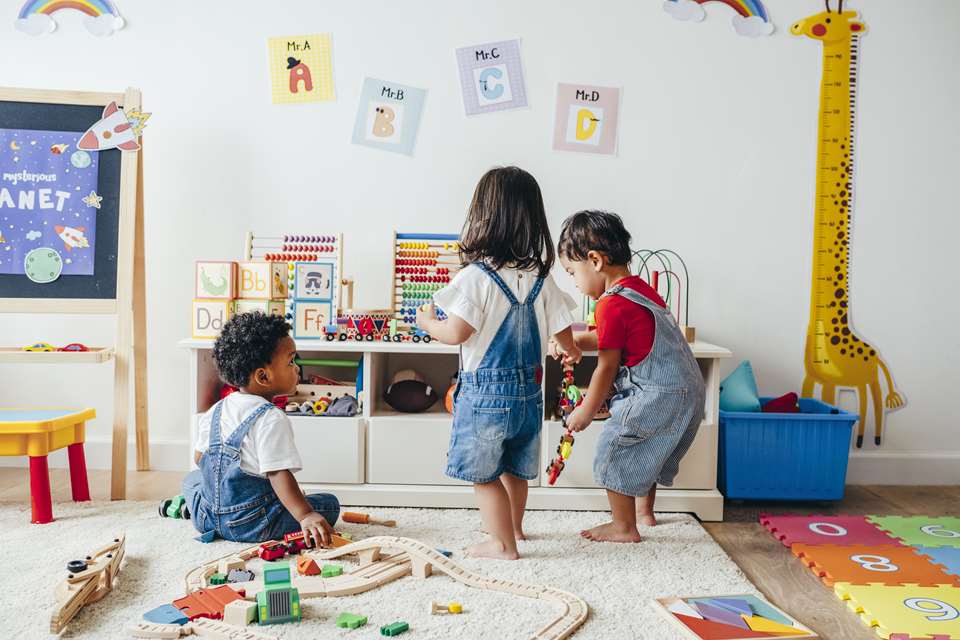Coronavirus: Children and staff will no longer need to keep to small 'bubbles' in early years settings
Catherine Gaunt
Thursday, July 2, 2020
Children and staff in nurseries and pre-schools will no longer have to stay in separate groups or bubbles from 20 July, the Department for Education has confirmed in updated guidance.

Previously, children had to keep within ‘small, consistent groups within settings’ but this requirement will be removed.
New guidance has also been released for schools in England from September, which says that attendance will be compulsory for all pupils and will be based on them staying within their year groups in separate bubbles.
Early years settings should still minimise ‘mixing where possible’ and all other protective measures must remain in place.
The guidance says that it is possible to do this because the UK alert level is now at 3 and the prevalence COVID-19 is down, and the NHS test and trace system is ‘up and running’.
‘From 20 July, early years settings will not be required to arrange children and staff in small, consistent groups,’ the guidance states.
‘Settings should still consider how they can minimise mixing within settings, for example where they use different rooms for different age groups, keeping those groups apart as much as possible.
‘Removing the groups approach is based on the fact that the overall risk to children and young people from coronavirus (COVID-19) is low. ‘It also recognises that early years settings are typically much smaller than schools. ‘Adopting the system of controls set out above here in a robust way will ensure there are proportionate safeguards for children as well as staff and reduce the chance of transmission.
‘Until 20 July, providers are expected to ensure that there are no more than 16 children in a single group in an early years setting. Providers can have several groups of 16 children if EYFS ratios and EYFS space requirements allow. While 16 children is the maximum in a group, keeping groups to 8 children, while adhering to EYFS ratios, is preferable, so groups are as small as possible.’
‘Parents and carers should be encouraged to limit the number of settings their child attends, ideally ensuring their child only attends the same setting consistently. This should also be the same for staff.’
Shielding
Shielding advice for all adults and children will pause on 1 August ‘subject to a continued decline in the rates of community transmission of coronavirus (COVID-19). This means that even the small number of children who will remain on the shielded patient list can return to settings, as can those who have family members who are shielding. The current shielding advice is available on GOV.UK.’
Children’s Minister Vicky Ford said ,'The education secretary’s confirmation that, from the 20 July, restrictions will be lifted on group sizes for nurseries and preschools marks a turning point for this hardworking sector. It paves the way for more children to transition back into the early education which is so vital for their development, and gives parents the flexibility to get back to work.
'I would like to offer my huge thanks to all the early years professionals who have continued to support families at this difficult time. The measures we put in place during the pandemic were to help keep people safe but we know how challenging this has been for many settings and I hope that the updated guidance today will provide a welcome boost as we continue on the road to recovery.
'Providers of early years childcare do so much for our youngest children’s education – that’s why we have continued early years funding to councils worth a planned £3.6 billion in 2020-21. We are also investing in organisations to help boost disadvantaged children’s development and wellbeing, with grants targeted at improving outcomes for young children at risk of falling behind by age five and for those with special educational needs.'
‘Big relief’
Nurseries have welcomed the decision to remove ‘bubbles’, saying keeping to small groups would have been financially unsustainable.
However, they stressed that it was still an uncertain time for the sector with fewer children returning than before the pandemic and urgent financial support from the Government was needed.
Zoe Raven, chief executive of Acorn Early Years Foundation, which recently kept one of its 12 nurseries open throughout a coronavirus outbreak, said, ‘It’s a big relief not having to work with bubbles anymore, which were financially unsustainable. Given our recent experience when we had to close bubbles in succession, it might have been easier to close the whole nursery at the outset.
A lot depends on the size and layout of the nursery, which vary enormously, so it would be good to allow nurseries to do their own assessments of whether sections can be kept entirely separate, or accept that the nursery would need to close for a fortnight in the event of a positive case. There is no financial compensation for nurseries in that case, however, who would have staff salaries to pay with no fee income, so there are huge financial implications for nurseries that are already struggling.'
Purnima Tanuku, chief executive of NDNA said, ‘The changes to the guidance on bubbles will be welcome to many childcare providers. How to manage consistent groups across a week while attendance at nurseries varies so much has been a key challenge for our members. We have been raising this issue in our regular discussions with the Government and it is good to see that providers, who have the knowledge and experience of their settings and families, will be allowed to use their professional judgement in keeping staff and children safe.
'Keeping to eight or 16 in a group would have pushed many settings into unsustainable positions. As a result of these measures and reduced numbers of children attending nearly three quarters of settings told us they expected to run at a loss for the coming months. This could see many childcare businesses close for good limiting the places available for children and families.
‘Nurseries always make the safety of children and their staff their number one priority. They will still have to risk assess how they work and take steps to minimise mixing of children as much as possible. Parents can be assured that all other protective measures will be in place around health and safety, infection control and settings will be working hard, providing high quality learning experiences.
‘This is still an uncertain time for the childcare sector as the Department for Education’s own figures show that only 20 per cent of children are back in early years settings. We need to see urgent investment with a recovery and transformation fund along the lines of the billions made available for schools. This is a crucial stage of a child’s life and the Government must act now to ensure the long-term availability of high quality early education and childcare.’
Chief executive of the Early Years Alliance, Neil Leitch, said, ‘We know that in the early years, one size doesn’t fit all and so the way a large nursery operates on a day-to-day basis is likely to be very different to, say, a small pre-school operating from a church hall or a childminder working out of their own home.
‘As such, it is positive that today’s guidance change will allow providers the flexibility to operate safely in a way that is most appropriate for their own provision.
‘There is no doubt, however, that keeping children, parents, practitioners and other early years staff safe has to be a priority and so it is important that there is clarity on the scientific basis for this decision, and what steps providers can and should take to ensure that they are still able to minimise the risk of infection transmission without the use of ‘bubbles’.
‘What’s more, with parental demand for childcare places still significantly below normal levels, we are clear that this change alone will not solve the huge financial challenges that nurseries, pre-schools and childminders are currently facing. It remains vital, therefore, that the Government commits to an urgent financial support package for the sector to ensure that they are able to survive this difficult period, and provide the care and education that families across the country need.’
Liz Bayram, chief executive at the Professional Association from Childcare and Early years (PACEY) said, ‘This is a step in the right direction and will make providing families with support easier. The need to continue to avoid mixing of children where possible will still present challenges but this guidance should give settings more flexibility in how they do this. That said the main challenge remains.
‘Most childminders, nurseries and pre-schools are still operating at significantly reduced capacity with almost 70 per cent in areas of deprivation stating in the Sutton Trust’s report that they are operating at a loss. This cannot continue and, with families unlikely to return to settings at the levels they did before the pandemic, Government has to act now to save these services. Continuing to underfund early education entitlements and now reducing support from the furlough scheme is creating a perfect storm alongside reduced demand.’
- Action for early years and childcare providers during the coronavirus (COVID-19) outbreak is available here










